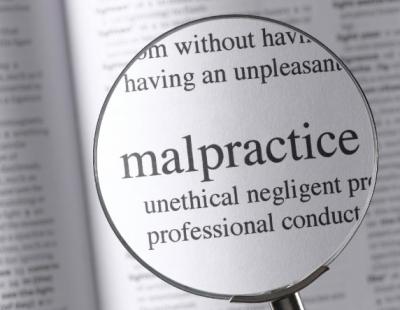
While the terms sound similar and are often used interchangeably, there are legal distinctions between medical malpractice and ordinary negligence. Knowing the difference is important when deciding whether or not you have a provable claim.
Simply put, the difference between medical malpractice and negligence is that medical malpractice is based on professional standards for trained medical services providers. In contrast, ordinary negligence is based simply on a general duty of care.
Medical malpractice depends on what professionals should know and do in any given situation. Ordinary negligence is based on any duty that one person owes another even without any specialized training or skills.
The difference between medical malpractice and negligence is the standard that applies to evaluate the actions of the person accused of causing an injury.
 What is Medical Malpractice?
What is Medical Malpractice?
The legal criteria used to determine whether or not an injury is considered medical malpractice typically involves an incident that occurs when a hospital, doctor or other health care professional, through a negligent act or omission, causes an injury to a patient. The negligence might be the result of errors in diagnosis, treatment, aftercare or health management.
To be considered medical malpractice under the law, the claim must have the following characteristics:
- A violation of what is known as the “standard of care.” The law acknowledges there are certain medical standards that are recognized by the profession as being acceptable medical treatment by reasonably prudent health care professionals under like or similar circumstances. (This is known as the standard of care.) A patient has the right to expect that health care professionals will deliver care that is consistent with these standards.
If it is determined that the standard of care has not been met, then negligence may be established. Determination requires that a medical professional within the same field of practice can state that, in fact, that standard was either not met or breached.
So, by way of example, if your child was injured during delivery, a general practitioner cannot — for the purposes of the law — make a determination that the standard of care was not met. Only a physician who practices labor and delivery can make that judgement.
- An injury was caused by negligence. For a medical malpractice claim to be valid, it is not sufficient that a health care professional simply violated the standard of care. The patient must also prove he or she sustained an injury that would not have occurred in the absence of negligence.
An unfavorable outcome by itself is not malpractice. The patient must prove that the negligence caused the injury. If there is an injury without negligence or negligence that did not cause an injury, there is no case.
- The injury resulted in significant damages. Medical malpractice lawsuits are extremely expensive to litigate, requiring testimony of medical experts and hours of deposition testimony.
 For a case to be viable, the patient must be able to show that significant damages resulted from an injury received due to medical negligence. If the damages are small, the cost of pursuing the case might be greater than the eventual recovery.
For a case to be viable, the patient must be able to show that significant damages resulted from an injury received due to medical negligence. If the damages are small, the cost of pursuing the case might be greater than the eventual recovery.
To pursue a medical malpractice claim, the patient must show that the injury resulted in disability, loss of income, unusual pain, suffering, and hardship, or significant past and future medical bills.
Medical malpractice can take many forms. Here are some examples of medical negligence that might lead to a lawsuit:
- Failure to diagnose or misdiagnosis
- Misreading or ignoring laboratory results
- Unnecessary surgery
- Surgical errors or wrong site surgery
- Improper medication or dosage
- Poor follow-up or aftercare
- Premature discharge
- Disregarding or not taking appropriate patient history
- Failure to order proper testing
- Failure to recognize symptoms
How Turner and Turner Can Help
Even if it’s evident your case is either a medical malpractice case or based on ordinary negligence, how you plead your case is a critical part of your claim. With years of experience and thousands of satisfied clients, the attorneys at Turner and Turner have the experience and trial hours to properly evaluate your case and determine what causes of action you can pursue.
